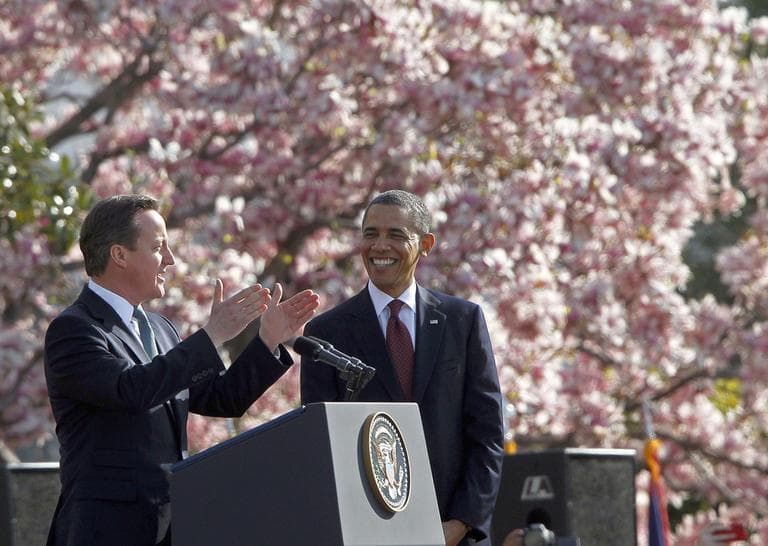Advertisement
Austerity vs. Stimulus
With David Cameron, British Prime Minister in the States this week, we'll compare how the U.S. and U.K. have tackled economic crisis. Austerity versus stimulus.

Economic crisis came. Everybody scrambled. In the U.S. we had big stimulus, auto bail-out, payroll tax cut, the Fed pumping money. In Europe, especially the United Kingdom, there was a stimulus – then austerity. Prime Minister David Cameron came in swinging a big austerity message. Cut, cut, cut to grow, he said. President Obama went the other way. Now Cameron’s in the U.S. How’s that all working out?
This hour, On Point: the U.K., the U.S. and austerity versus stimulus. What’s worked?
Plus we’ll look at this week’s amazing, public dressing down of Goldman Sachs.
-Tom Ashbrook
Guests
Ken Rogoff, professor of public policy and economics at Harvard University.
Richard Jackman, a professor of economics at the London School of Economics.
C-Segment: Goldman Sachs
William Cohan, a columnist for Bloomberg View, and author of Money and Power: How Goldman Sachs Came to Rule the World. His recent article on Goldman Scahs is here.
You can find the explosive New York Times Op-Ed, written by former Goldman Sachs senior executive Greg Smith here.
From Tom's Reading List
The New York Times "What Greek experience actually shows is that while running deficits in good times can get you in trouble — which is indeed the story for Greece, although not for Spain — trying to eliminate deficits once you’re already in trouble is a recipe for depression. "
The Guardian "In the US and across Europe, academic economists and policymakers are dividing as the improving American economy – unemployment is falling – suggests that the Obama administration's policy of trying to delay cuts is preferable to the brutal shrinking of the state being pursued on the other side of the Atlantic, where more and more people losing their jobs."
The Economist "The deputy prime minister is by instinct a free-market liberal on the flinty, centre-right edge of his party. He is not a great fan of statist or bureaucratic solutions to society's woes. He is no swooning admirer of trade unions, and is sincerely concerned about the need for public sector reforms and the desperate urgency of making Britain more competitive internationally."
Advertisement
Excerpt: Money and Power
[Use the navigation bar at the bottom of this frame to reformat the excerpt to best suit your reading experience.]
http://www.scribd.com/doc/85483313/Money-and-Power-Excerpt
This program aired on March 15, 2012.